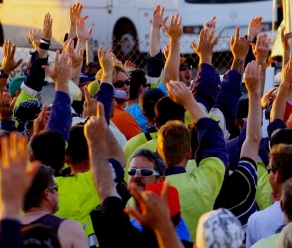The Federal Court upheld the decision that workers should lose company paid accommodation during industri Pluto workers were at the centre of the caseal action. This could impact on the camp operators who may be required to enforce the eviction of striking worker's from camps as directed by the worker's employers.
Pluto workers were at the centre of the caseal action. This could impact on the camp operators who may be required to enforce the eviction of striking worker's from camps as directed by the worker's employers.
The court yesterday dismissed an appeal from the construction union, which complained that Mammoet Australia had told striking staff to vacate dongas at Woodside's Pluto project in the North West in 2010.
The decision has wide-reaching ramifications across the entire sector, by confirming that employers have the right to withdraw company accommodation from striking workers even in remote areas where they are far from home.
It is a psychological win for mine sector employers, who have been battling against growing union influence in the industry in recent years.
The court case had involved 10 crane drivers and two forklift operators who were forced to leave the camp at the start of their strike in late April 2010 as part of a campaign for a 7 per cent pay rise.
The workers were ordered back to work in late June by Fair Work Australia.
The Federal Court agreed that Mammoet had been right to remove access to camp site dongas because the accommodation, like living-away-from-home allowances, were deemed part of their payment.
Under industrial law, employers are not allowed to pay workers when they take industrial action, even when the stoppage is considered lawful.
The Construction, Forestry, Mining and Energy Union complained it would make it impossible for some workers to use their legal right to strike.
"The decision effectively prevents thousands of remote workers all over Australia from taking legitimate protected industrial action for better wages and conditions as they will have nowhere to live if they do so," said CFMEU secretary Mick Buchan.
"These remote workers don't have the luxury of ordinary workers, who can take protected action and still have a roof over their head."
Mr Buchan said accommodation in the North West was hard to find and extremely expensive.
Workers would have to pay their own airfares to Perth, which could cost more than a thousand dollars at short notice.
Mr Buchan said the accommodation was not part of a worker's payment but a condition of employment that should be maintained during a protected strike.
Employer body AMMA yesterday said it was a fair outcome. Chief executive Steve Knott said there were ongoing costs associated with keeping workers on site, such as food and electricity.
"Once they withdraw labour, the company has the right to withdraw its facilities," he said.

